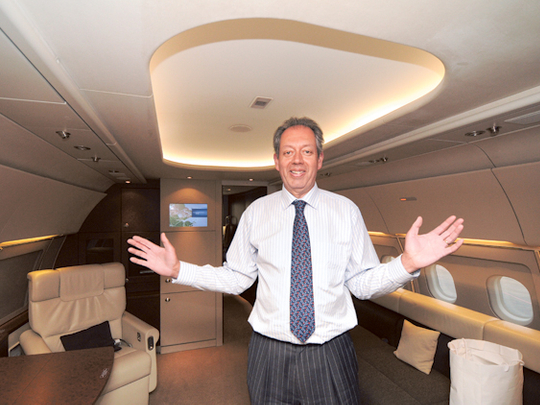
Dubai: Airbus’ new engine options could reduce fuel burn by up to 15 per cent if used in combination with its new Sharklets.
Talking to reporters in Dubai on Wednesday about the demand for Airbus aircraft, David Velupillail, Marketing Director, Airbus Corporate Jets, said: “We can deliver up to 15 per cent [in fuel savings] with the Sharklet and the new engine options which for any airline is absolutely huge considering they’re flying every day.”
Airbus expects to achieve an eight per cent decrease in operating costs and a reduction of nitrogen oxide emissions by at least ten per cent compared with to the existing A320 series.
More than 2,600 orders have already been made for A320 new engine options (neo) equipped with either the Pratt & Whitney (P&W) PurePower PW1100G-JM engine, or the CFM International advanced LEAP-X engine: they are working on, and will eventually offer both engine options.
Airbus previously stated it expects to sell more than 4,000 of the re-worked aircraft when the new engine options are completed between the end of 2015 and spring 2016.
“We will begin flight testing next year,” Velupillail said. “The deliveries to the airlines won’t begin until the end 2015. Eventually it will feed through to the corporate jets; but that is some way off yet.”
Gulf Airlines eyes neos
Interest from the Middle East is already high for the neos. Qatar Airways have placed 50 orders for A320neos and Bahrain carrier Gulf Air has ordered ten.
Also, Dubai-based low-cost carrier (LCC) flydubai, is expected to place an order for 50 narrowbody jets at the Dubai Airshow and has declared an “open race” between Boeing’s 737 MAX and the Airbus A320neo for the deal. Chief Executive of flydubai Gaith Al Gaith has said he doesn’t intend to split the order between the two companies.
Boeing’s response to Airbus’ fuel saving neo family was to launch the B737 MAX to replace the B737 Next Generation aircraft by 2017 — 50 years after the 737 first 737 took flight. The American aircraft manufacturer has received 1,609 firm orders for the new MAX as of October this year.
Airbus’ new Sharklets alone reduce fuel consumption by up to 4 per cent and extend mission range by 100 nautical miles, the company says. The market potential for the new Sharklets could see some 4,000 in-service A320s retrofitted with the 2.4 metre-tall wingtip devices.
Two hundred commitments have already been secured for retrofits, including US-based carrier JetBlue.
Though airline business has remained robust for Airbus, confidence has been notably dwindling in the corporate arm of the industry, Velupillail added.
Challenging market
“We started the year expecting to sell about 500 aircraft, and we’re already well beyond 1,000. But on the corporate jet side, it’s a market we would like to see more active.
“The whole industry has been much more challenging — it’s not something special to Airbus. Boeing, Gulfstream, Embraer, Bombardier are all facing a more challenging market. But the Middle East remains an important [bizjet] market for us.”
Of the 1,700 Airbus corporate jets sold around the world, roughly half have been sold to customers in the Middle East.
Airbus delivered the first-ever business jet to comprise mini-suits to Emirates earlier in the year. The executive Airbus ACJ319, which is offered for VVIP charter, will be on display at the Dubai Airshow. The private jet has ten mini suits available in total.












